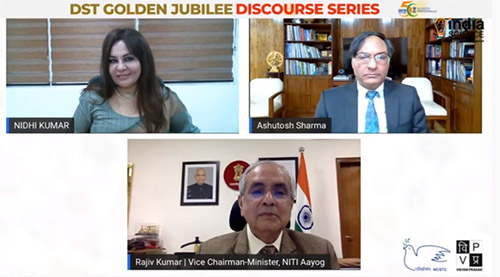 India would soon be among the top economies using S&T: NITI Aayog Vice Chairman
India would soon be among the top economies using S&T: NITI Aayog Vice Chairman
Vice-Chairman, NITI Aayog, Dr. Rajiv Kumar, emphasised that the Indian economy would be among the top economies in the world in the next few years using science, technology, and innovation in all sectors, bouncing back soon after the effects of COVID 19, at a webinar organized to celebrate 50 years of the Department of Science and Technology (DST).
“Steps and reforms have been taken by the Government in all the sectors, like agriculture, modern medicine, traditional medicine, New Education Policy, Small & Medium Enterprises, labour sector and so on, to target being among the world’s top three economies possible,” he said at the webinar on DST Golden Jubilee Discourse Series - On the other side of the Pandemic - organised by National Council for Science & Technology Communication and Vigyan Prasar.
He said that the pandemic has changed many things and shown news ways of doing things, like online meetings, and many of these are going to stay in the post-COVID world, and we need to have an innovative economic system in the post-COVID world to remain floating.
Dr. Kumar added that the economy post-COVID has been in the recovery mode after the first quarter and hoped that Indian economy will bounce back in next few quarters from the effects of COVID-19 disruptions, will grow by average 7-8 percent in next 20-30 years and become the third-largest economy by 2047.
Talking about the structural reforms by the government to help Indian economy compete with the best of the world, Dr. Kumar said, “The government is committed to improving the ease of doing business, innovation ecosystem where every school student has access to the innovative tools and trends.”
Speaking at the webinar, DST Secretary Prof Ashutosh Sharma highlighted the various steps DST has taken to help Indian economy grow at the desired rate by using science, technology, and innovation in all fields like clean energy, health, education, transport, agriculture, communication, electric mobility, electric storage, quantum technologies and so on. He also talked about the steps DST has taken to give flexibility to scientists to deliver the desired results for technology missions and steps taken to help increase the number of startups using innovation, science, and technology.
“DST in the last 50 years has done a lot of building of capacity, in all areas. India is number three in science publication in the world, and DST has a great role in it. Our last 50 years has been glorious, but our next 50 years should exceed the last 50 years. Our budget has doubled in the last five years, and it allows us to chart new directions. While keeping all the basic research and development in place and enhancing it, we have introduced a problem-solving approach to research. We are ready for the future, and there is a whole lot of new emphasis on innovation and startups and new models of innovation”, Prof Sharma said.






























